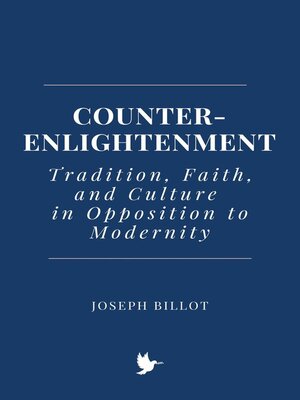Counter-Enlightenment
ebook ∣ Tradition, Faith, and Culture in Opposition to Modernity
By Joseph Billot

Sign up to save your library
With an OverDrive account, you can save your favorite libraries for at-a-glance information about availability. Find out more about OverDrive accounts.
Find this title in Libby, the library reading app by OverDrive.



Search for a digital library with this title
Title found at these libraries:
| Library Name | Distance |
|---|---|
| Loading... |
This book explores the intellectual movement known as the Counter-Enlightenment, which arose in opposition to the Enlightenment's emphasis on reason, secularism, and universalism. It examines the key figures and ideas that shaped this critique, from Giambattista Vico and Johann Georg Hamann to Joseph de Maistre and Edmund Burke, and analyzes their defense of tradition, faith, cultural particularism, and the importance of community. The Counter-Enlightenment rejected the Enlightenment's belief in progress through reason alone, arguing instead that human life is shaped by historical continuity, religious authority, and cultural identity.
By tracing the influence of the Counter-Enlightenment through Romanticism, modern conservatism, nationalism, religious revivalism, and contemporary critiques of secularism, the book highlights the movement's enduring relevance in today's intellectual and political debates. The Counter-Enlightenment's skepticism toward the uncritical embrace of reason and progress provides a framework for addressing challenges such as technological disruption, globalization, environmental crises, and the search for meaning in a secular world.
This work offers a comprehensive examination of the Counter-Enlightenment's key contributions to philosophy, politics, and cultural thought, providing insight into the ongoing tension between modernity and tradition, reason and faith, individualism and community. By engaging with these enduring debates, the book reveals how the Counter-Enlightenment's legacy continues to shape contemporary discussions on the future of human civilization.







